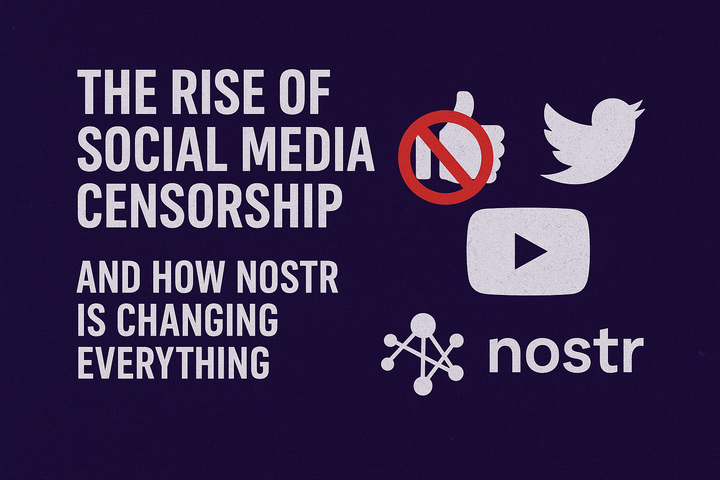How Centralized Platforms Are Rewriting Free Speech
Platforms like X, Facebook, and Google are gatekeepers of what we can say, see, and think.

Post sponsored by Bull Bitcoin, the best Bitcoin only Exchange. Buy & Sell Bitcoin, DCS + pay your bills with Bitcoin.
If you’ve been online lately, you’ve probably noticed something unsettling: the digital town square isn’t as open as it used to be.
Platforms like X, Facebook, and Google—once heralded as bastions of free expression—have morphed into gatekeepers of what we can say, see, and think.
Bans, shadowbans, and algorithmic censorship are now the norm, and the average user is caught in the crosshairs. So, what’s going on, and why should you care?
Let’s start with the obvious: these are private companies, not governments. They can do what they want, right?
That’s the line we’ve been fed for years. But when a handful of tech giants control the vast majority of online discourse, their decisions ripple far beyond their terms of service.
They’re not just platforms anymore—they’re arbiters of truth, wielding power that rivals (or exceeds) that of any state. And they’re not shy about flexing it.
Thanks for reading ON NOSTR ! Subscribe for free to receive new posts and support my work.
Take X, for example.
Once a chaotic free-for-all where ideas duked it out in real time, it’s now a place where accounts vanish without explanation, posts get buried, and certain topics feel like they’re walking on eggshells.
Sure, the leadership has shifted, and some say it’s freer than before—but the tools for silencing are still there, and they’re still being used.

Whether it’s “misinformation” (a term so vague it could mean anything) or “hate speech” (ditto), the banhammer swings fast and loose.
Facebook’s no better.

Remember when it was just for sharing cat pics and arguing with your uncle?
Now it’s a labyrinth of fact-checkers, content warnings, and outright post deletions.
Say something too spicy about a hot-button issue, and you’re not just muted—you’re erased.
Entire groups get shut down overnight, often with no appeal.
And Google?
It’s the quiet giant, tweaking search results and YouTube recommendations to nudge you toward “approved” narratives.

Ever notice how certain stories just… disappear from the top results?
That’s not an accident.
The justification is always the same: safety, trust, protecting the community. Noble goals, sure—but who decides what’s safe?
Who gets to define “trustworthy”?

It’s not you or me—it’s a mix of faceless moderators, opaque algorithms, and executives with their own biases and bottom lines.
And let’s not kid ourselves: these moves often align suspiciously well with political pressures, advertiser demands, or whatever cultural wind is blowing hardest that week.
The stats back this up.
Millions of posts and accounts have been axed across these platforms in recent years—some for clear violations like threats, but many for stepping over invisible lines.
The appeal processes are a joke: automated responses, no transparency, and good luck getting a human to care.
Meanwhile, shadowbanning—where your voice is throttled without you even knowing—has become so common it’s practically a feature, not a bug

Why does this matter? Because centralized control over speech isn’t just a tech problem—it’s a freedom problem.
When a few companies can dictate what’s sayable, they’re not just curating content; they’re curating reality. Dissent gets quieter, ideas get narrower, and the Overton window shrinks to a peephole.
You might not feel it today, but when the next big debate rolls around—whether it’s about climate, health, or politics—you’ll notice the edges of the conversation have already been trimmed.
So, what’s the fix?
Decentralization is the buzzword du jour, and it’s not a bad start.
The Nostr promise is a web where no single entity holds the reins. But they’re still niche, and the average person isn’t ditching X or Facebook anytime soon—network effects are a hell of a drug.
For now, it’s about awareness: knowing the game’s rigged, amplifying what’s suppressed, and building lifeboats before the ship sinks further.
The irony?
These platforms rose to power by promising us a voice.
Now, they’re betting we won’t notice when it’s taken away.
Prove them wrong.
Speak up where you can, share what’s buried, and don’t let the algorithm decide what matters. The digital age was supposed to liberate us—not gag us.
Thanks for reading ON NOSTR ! Subscribe for free to receive new posts and support my work.



Comments ()